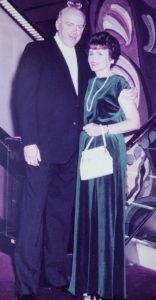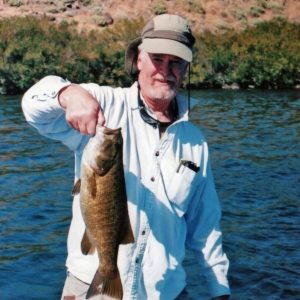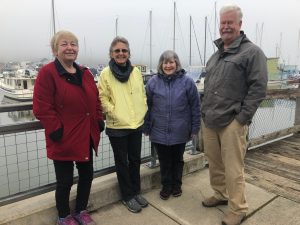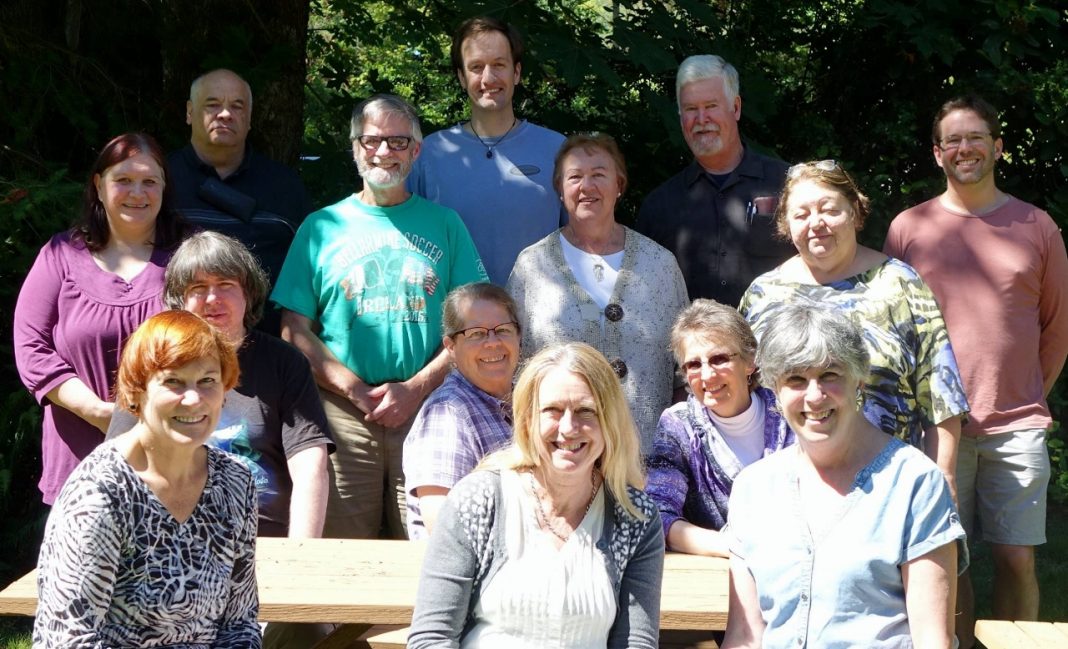If Raymond Chandler, F. Scott Fitzgerald, Toni Morrison and Mary Higgins Clark were starting their writing careers today in Thurston County, they would find a great resource in the Puget Sound Writers Guild. The nonprofit guild offers structured guidance, teaching, writing tips and feedback on the creative writing process to area authors of commercial-length fiction.

Local author and acupuncturist Carol DeMent credits the guild with helping her get a handle on writing her award-winning first novel, “Saving Nary,” a tale of Cambodian refugees resettling in the Pacific Northwest. “My hats off to the guild to help me understand about the structure of a novel,” says DeMent. “I learned the nuts and bolts of a well-crafted novel. I learned the craft. It was very interesting, and the critiques were very helpful.” DeMent is the guild treasurer and is currently several chapters into writing her second historical fiction novel.
Frank Lambirth, a retired creative writing professor and author of 34 suspense, mystery and horror books, founded the guild in the mid-1980s. Lambirth also ghost-wrote and edited others’ books. Lambirth led the guild from his Olympia home until his death in February 2007.
“Frank was a colorful character,” says Hal Dygert, Olympia author, retired attorney and geologist, and current guild president. Dygert has been with the guild for more than 30 years. Dygert writes crime novels, using familiar settings such as the Columbia River. Dygert is working to publish his most recent novel.
Fittingly, Dygert says there is a bit of mystery as to Lambirth’s early years. While Lambirth did not divulge details, he had suggested he may have worked in national security at one time. His obituary refers to his cartography work that was for the Department of Defense’s former subagency, which prepared national intelligence studies from 1941 to 1968. Lambirth may have called upon some of those memories in his books, in a commercially viable way and without revealing secrets. “He wrote a couple of books under his own name and others as pseudonyms,” Dygert says. “He saw those [pseudonyms] as saleable property. He would develop the property and then sell the pseudonym. It had value.”

While Lambirth focused on the creative side of the book writing process, Dygert says Lambirth’s wife Pat managed the commercial side. “His wife was the businessperson, he was the creator,” Dygert explains.
Laura Swan, author of contemporary and historical fiction, agrees Lambirth was memorable. “He was quite the storyteller,” she says. “He was a gifted teacher.” Swan is a member of the Benedictine community at the Saint Placid Priory in Lacey. Swan is the guild’s past president and manages its online presence. Swan also wrote books on the women’s spirituality. After Lambirth died, the guild moved its meetings to the priory, although with COVID-19 they moved online via Zoom.
Lambirth was familiar with the notable and rigorous Iowa Writers’ Workshop, organizing the guild with that approach in mind. He divided the guild into a novice class and a critique group. The novice class teaches techniques of internal structure to plan and produce commercial long-form fiction in the mainstream, action/adventure, literary, historical, fantasy, alternative history and mystery genres. The novice class is for serious writers and takes several months to complete. A writer must finish the novice class before graduating to the critique group.
The critique group is comprised of authors planning, executing and marketing their manuscripts. The group meets weekly to provide feedback and critique others’ writing projects. Patricia McClure, guild vice president, says the critique group can be a challenge for some writers. While the group’s input on writers’ manuscripts is not personal, McClure says authors often use parts of their own lives in their books so the feedback from fellow authors can feel personal. “There are bits and pieces of us in those,” she says. “You have to develop a skin.” Her three-book series and its prequel are set in a fictional abbey in eastern Montana.

DeMent is one of the writers who completed the novice class, published a novel, and is currently in the critique group. Both DeMent and Swan say the guild’s two-step process taught them to be better writers, critics and readers.
On occasion the guild invites well-established authors to speak. Best-selling suspense writer Hallie Ephron was one such guest speaker. She is part of the Ephron writing dynasty as the daughter of screenwriters Henry and Phoebe Ephron (“Carousel” and “Desk Set”), and sibling of Ephron sisters Nora (“When Harry Met Sally”), Delia (“You’ve Got Mail”) and Amy (“A Cup of Tea: A Novel of 1917”). While no guest speakers are currently scheduled, Swan say the guild hopes to re-start that effort in the future.
More information, visit the Puget Sound Writers Guild website and Facebook page.




















































